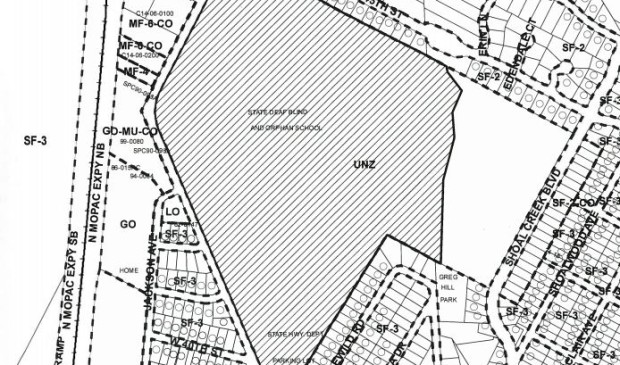Council wants to move forward with Grove PUD
Wednesday, October 19, 2016 by
Jack Craver Mayor Steve Adler hopes to start the process of approving the Grove at Shoal Creek, a controversial planned unit development in Central Austin, at City Council’s next meeting on Thursday.
At a Council work session on Tuesday, Adler explained to Council colleagues that he supports approving a draft plan of the PUD on “first reading” at their next meeting. He noted, however, that whatever is approved on the first reading (of the required three) will simply be a “placeholder” draft that he will be open to changing after further talks with city staff, neighborhood groups and the developers pushing the project.
Adler suggested that the “placeholder” ordinance largely mirror the recommendation made by the Zoning and Platting Commission in July but incorporate some of the amendments proposed by Council Member Leslie Pool that would reduce the amount of retail and commercial space allowed on the now-vacant 75-acre field at the corner of Bull Creek Road and 45th Street.
But in a clear attempt to foster compromise, the mayor also suggested that some of Pool’s other proposed changes, including one that would sharply reduce the number of vehicle trips the project is allowed to generate, be left out of the draft.
The mayor’s position comes a day after ARG Bull Creek Ltd., the company seeking to develop the property, sent a letter to Adler and members of Council threatening to pull its PUD application if Council adopts Pool’s amendments, particularly those that seek to reduce the size of the project. Abandoning its application for PUD zoning, ARG has claimed, will leave it with no choice but to pursue conventional zoning, which would likely produce a development of expensive single-family homes.
Pool called Adler’s suggestion fair but stressed that more discussion and negotiation needs to take place before the ordinance is approved on subsequent readings. Council had to make clear to the community, she said, that it “has its ears open to what the neighbors who will be most affected by this development are saying.”
Council Member Greg Casar, who is viewed by some as one of the most development-friendly voices on Council, noted that when dealing with other PUDs, the “placeholder” draft passed by Council was generally the same recommendation made by the land-use commission (either the Zoning and Platting Commission or Planning Commission). He was “concerned” about including Pool’s amendments in the first reading, but he said he would be willing to support the mayor’s suggested draft if it were truly just a “placeholder.”
Council Member Sheri Gallo, who has long been viewed as an ally of the project pushed by ARG but who is running for re-election against three candidates who oppose the proposal, emphasized her commitment to communication with the neighborhood groups. There was a consensus, she said, that a PUD would provide a better product than conventional zoning.
Gallo also said that she had worked hard to make changes to the project requested by area residents, and she added that she was offended by the suggestion that some of the amendments she had offered were “low-hanging fruit,” a reference to a recent comment in The Austin Chronicle from Grayson Cox, vice president of the Bull Creek Road Coalition, the neighborhood group opposing the current proposal.
Gallo said she was very “distressed” by the division created in the surrounding area by the debate over the Grove. “We have neighbors saying really ugly things about neighbors,” she said.
Council Member Delia Garza, who at a previous work session had expressed frustration with the amount of time Council has been devoting to the project, suggested there were other things Austinites should be getting worked up about.
“We have such inequities in our community and such sad things happening, and this has created that discourse,” she said. “It’s eye-opening.”
This story has been corrected. It originally included the opinion that Council Member Greg Casar “is viewed as one of the most development-friendly voices on Council.”
The Austin Monitor’s work is made possible by donations from the community. Though our reporting covers donors from time to time, we are careful to keep business and editorial efforts separate while maintaining transparency. A complete list of donors is available here, and our code of ethics is explained here.
You're a community leader
And we’re honored you look to us for serious, in-depth news. You know a strong community needs local and dedicated watchdog reporting. We’re here for you and that won’t change. Now will you take the powerful next step and support our nonprofit news organization?






